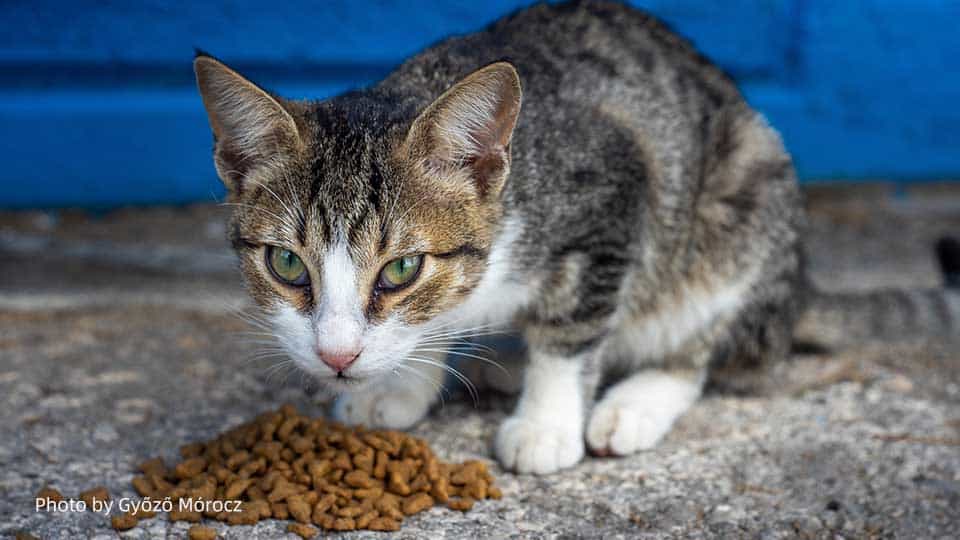Kittens are adorable, playful, and energetic creatures that require a lot of attention, love, and care.
As a responsible pet owner, it’s your job to provide them with the best possible nutrition to help them grow into healthy and happy adult cats.
However, with so many types of cat food in the market, it can be overwhelming to figure out what’s best for your kitten.
In this post, we’ll answer some of the most common questions about cat food and kittens, including whether kittens can eat adult cat food.
Contents
ToggleWhat happens if my kitten eats my older cat's food?
It’s not uncommon for curious kittens to sneak a bite or two of their older sibling’s food.
While it might not cause immediate harm, adult cat food is not designed for the specific nutritional needs of growing kittens.
Kittens require more protein, fats, and nutrients, such as calcium and phosphorus, to support their rapid growth and development.
Feeding your kitten adult cat food for an extended period could result in deficiencies and stunted growth.
Can kittens eat any type of cat food?
The short answer is no.
Kittens have unique dietary requirements that differ from adult cats.
To ensure proper growth and development, you need to feed your kittens a diet specifically formulated for their needs.
Look for kitten food labeled “complete and balanced” and meets the nutritional guidelines the Association of American Feed Control Officials (AAFCO) set.
As for a baby cat, a 4-week-old kitten for example, should typically still be nursing or on a kitten-specific milk replacement.
They can gradually be introduced to wet kitten food around this age, but it is too soon for them to eat dry food.
What age can kittens eat regular cat food?
As kittens grow, so do their dietary needs.
Generally, it is safe to transition kittens to adult cat food when they reach one year of age.
However, some larger breeds may require a longer kittenhood diet.
Consult your veterinarian for personalized advice based on your cat’s breed and individual needs.
How do I stop my kitten from eating my other cat's food?
If you have multiple cats at home, it’s common for one kitten to try to steal the other cat’s food.
To prevent this from happening, you can feed your cats in separate rooms or use bowls that are designed to recognize each cat’s microchip or collar tag.
You can also try feeding your cats on a schedule, so they learn to eat at specific times and don’t feel the need to graze throughout the day.
How to pick a cat food for kittens?
When choosing a cat food for your kitten, there are several factors to consider, such as their age, breed, and health condition.
Here are some tips to help you pick the right cat food for your kitten:
- Look for a high-quality brand: Choose a cat food brand that uses high-quality ingredients and doesn’t contain fillers or artificial preservatives.
- Check the label: Make sure the cat food meets the nutritional requirements of kittens and contains essential nutrients such as protein, fat, and vitamins.
- Choose a specific formula: Look for cat food that’s specifically formulated for kittens, as it contains the right balance of nutrients to support their growth and development.
- Consider your kitten’s health needs: If your kitten has any health issues, such as allergies or digestive problems, consult with your veterinarian to choose a cat food that meets their specific needs.
How can I tell if my kitten has health issues requiring a specific formula?
As a pet owner, it’s important to keep an eye on your kitten’s health and behavior to detect any potential health issues early on.
Here are some signs to watch out for that may indicate that your kitten needs a specific formula:
- Digestive issues: If your kitten is experiencing diarrhea, vomiting, or constipation, it may be a sign that they have digestive issues. In this case, you may need to switch to a formula that’s easier to digest or contains specific ingredients that can help with digestive problems.
- Skin and coat issues: If your kitten has dry, itchy, or flaky skin, or a dull or patchy coat, it may be a sign of a skin or coat issue. In this case, you may need to switch to a formula that contains omega-3 and omega-6 fatty acids, which can help improve skin and coat health.
- Allergies: If your kitten is experiencing symptoms such as itching, sneezing, or coughing, it may be a sign of an allergy. In this case, you may need to switch to a formula that doesn’t contain the allergen or contains ingredients that can help alleviate allergy symptoms.
- Weight issues: If your kitten is underweight or overweight, it may be a sign that they need a specific formula that’s tailored to their individual needs. In this case, you may need to consult with your veterinarian to determine the right formula and feeding schedule for your kitten.
If you notice any of these signs or other unusual behaviors or symptoms in your kitten, it’s important to consult with your veterinarian.
Check out our post for more details about Maine Coon cat’s common health issues.
They can help you determine if your kitten needs a specific formula or if there’s an underlying health issue that needs to be addressed.
How can I tell if my kitten has allergies and what ingredients should I avoid?
Allergies are not as common in cats as they are in dogs, but they can still occur.
If you suspect that your kitten has allergies, look for these signs:
- Itching and scratching: If your kitten is constantly scratching or biting at their skin, it may be a sign of allergies.
- Sneezing and coughing: Allergies can also cause respiratory symptoms such as sneezing and coughing.
- Vomiting and diarrhea: Some cats may experience gastrointestinal symptoms such as vomiting and diarrhea due to allergies.
- Ear infections: Allergies can also lead to ear infections, which can cause your kitten to shake their head or scratch at their ears.
If you suspect that your kitten has allergies, you take them to the veterinarian for an evaluation.
Your veterinarian may recommend allergy testing to determine the specific allergen causing your kitten’s symptoms.
If your kitten does have allergies, there are certain ingredients that you should avoid when choosing a cat food.
Common allergens in cats include:
- Beef
- Dairy products
- Fish
- Chicken
- Lamb
- Corn
- Wheat
- Soy
- Eggs
If your kitten has a known allergy to a specific ingredient, it’s important to avoid that ingredient completely.
Additionally, you may want to choose a cat food labeled as hypoallergenic or limited ingredients, as these formulas contain a limited number of components and are less likely to cause allergic reactions.
It’s important to note that not all cats with allergies will have the same reactions to the same ingredients.
Therefore, it’s essential to work closely with your veterinarian to determine the best diet for your kitten based on their individual needs.
Final Thoughts
In conclusion, while kittens may be tempted to eat adult cat food, it’s important to feed them high-quality kitten food that’s specifically formulated for their nutritional needs.







